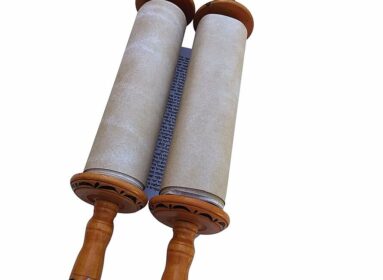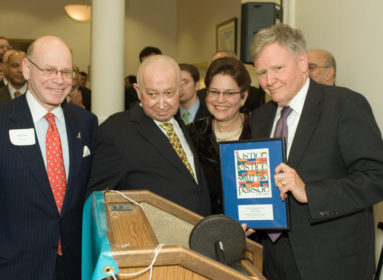By Dr. Vera Schwarz
Levana Polate of West Hartford, who died recently, was a lecturer in modern languages at Trinity College in Hartford. She taught Hebrew courses incorporating the teaching of Israeli culture and Israeli literature in all her language classes. Dr. Vera Schwartz of West Hartford, a professor at Wesleyan University in Middletown, memorialized Polate in this piece.
The light in her eyes spoke forbearance and mercy…
Were it not that women are not compared to angels,
I would say she was just like one of God’s own angels.
S.Y. Agnon, “Tehilla”
A few months before my dear friend Levana died, she cleared her Trinity College office. In the process, she set aside key works of Jewish fiction that she thought I would appreciate. The first in the packet I received was Shai Agnon’s “Tehilla.” Agnon was Levana’s favorite modern author and she often gave talks about him. In our intimate friendship, he was a silent partner. Today, as I mourn getting news of her death from her sons, Avi and Nitzchi, I see that this story was one more gift in our long, and loving goodbye. Agnon is writing about an old Yerushalmi woman who radiates light. Levana was not old, yet she gave off more luminosity than even Tehilla or the moon that was her namesake, and the subject of one of her last works… a marvelous children’s story about astronomy and light.
As my own world grows darker with grief, I hold on fiercely to memories of my dear soul-sister. We often spoke of being kin. From the day we met at Wesleyan, where Levana taught Hebrew for a brief while, there was no end to our talk. Our first lunch went on for three hours and left me reeling with awe at the suffering Levana had endured as a girl and young woman: raw poverty, a much too early marriage and years of uncertainty culminating in mothering, meaningful social work, and finally the discovery of her own gifts for creating and teaching literature. It was not only the suffering of her youth that imprinted itself in my mind. More importantly, the joy, the love in her eyes and voice as she spoke of family and art.
After our meeting at Wesleyan, we became neighbors in West Hartford. We started a marvelous small group of writers called “Sofrot” — where we encouraged each other’s writing in monthly meetings over tea for a few years. In those hours, we watched Levana grow as a poet. Our small group helped navigate her past the cliffs of self-doubt and dread to the release of her first volume of collected poems–“Lavan Al Gabei Lavan,” White on White. It came out in the late summer of 2009 — coinciding with the diagnosis of cancer.
The marvelous Trinity celebration of this book displayed Levana’s super-human courage in letting her soul’s light shine when pain was already crippling her body. We grew closer and closer. The two blocks separating our homes became shorter each Shabbat. We did not dwell on illness. Instead, while we could, we spoke of poetry, Chinese culture, Torah… When she was too weak, we just held hands. Last Shabbat afternoon before she went to Israel, she asked to lie in my lap and I brushed her tired forehead and eyes.
Levana, my dear dear Lavana… Wanting to commune with you again, I open your book of poems… I remember when you wrote the raw, courageous poem, “Al Chet”–“For our sins.” Like Yehuda Amichai, you were gifted in using the language of the Jewish bible and liturgy for your powerful voice. Here, at the start of a new year bereft of you, I read the confession that you extracted from all of us for the injury we do to language itself. You, who understood silence better than anyone I know, rose to the defense of broken vessels that serve to shed light in Kabala–as well in our world below – where you were the supreme artist of love. Without you now, I can only give you back your own words. Hear them well, my dear friend! You left us a luminous legacy in the wake of black holes:
Now
that words are utterly broken
the
hope
in
broken
language
is
the
hope
of
mankind
The hourglass shape of this poem is not accidental. It leads to hope, the way my tears must now illuminate a path I travel with you but from a shattering distance that cannot be traversed — just yet.
Readers are invited to submit original work on a topic of their choosing to Kolot. Email submissions to editorial@jewishledger.com.







 Southern New England Jewish Ledger
Southern New England Jewish Ledger













